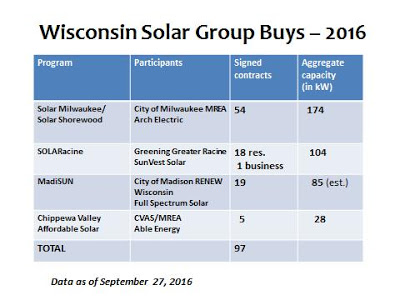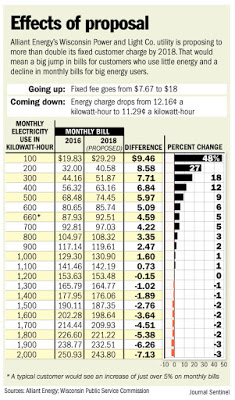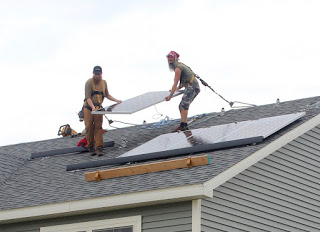
by jboullion | Sep 28, 2016 | Uncategorized
 |
Full Spectrum Solar workers install a solar array for the
MadiSUN Group Buy Program. |
By the end of this year, nearly 100 Wisconsin households will become owners of new solar PVsystems on their rooftops as a result of four group purchase programs initiated in 2016. The communities served by these programs are Milwaukee (and neighboring Shorewood), Madison, Racine and Eau Claire (see table below).
Solar group purchase programs are designed to reduce the cost and complexity of installing solar panels on individual houses. In a typical solar group purchase, a city and/or a community organization works with a single contractor to simplify the site assessment, permitting, installation and interconnection process at a preset price to interested households. By organizing these installations in a single package, the contractor is able to acquire equipment from suppliers at a discount, and pass the savings to the group program participants.
Individual households are invited to attend meetings in and around the community, where they can gather information about the program offerings (including incentives and financing options) and arrange for a free site assessment.
Though not new in Wisconsin, solar group purchasing is having a breakout year this year, due to the convergence of several factors.
– Continued declines in equipment costs;
– An increase in state incentive dollars this year for residential solar installations;
– A judicial decision in October 2015 that invalidated an onerous solar connection charge in We Energies’ territory.
The judicial reversal arose from a lawsuit filed by RENEW and The Alliance for Solar Choice challenging We Energies’ solar charge, which was approved by the Public Service Commission in November 2014. It is hard to overstate the importance of that court decision, since more than 70 of the nearly 100 households participating in community group purchasing programs are customers of We Energies. Had that solar connection charge taken effect in January 2016, the cost of going solar would have risen by 30% in We Energies territory.
Wisconsin’s two largest cities are running their solar group purchases through their respective Solar America programs (Milwaukee Shines and MadiSUN). Milwaukee is partnering with Midwest Renewable Energy Association while Madison has paired up with RENEW. In contrast, local solar enthusiasts such as Tom Rutkowski in Racine, and Steve and Ellen Terwilliger in Eau Claire, took the initiative in organizing SOLARacine and Chippewa Valley Affordable Solar, respectively. Chippewa Valley Affordable Solar, the newest of the four programs to get off the ground, is set to continue operating through 2017. The MadiSUN program is likely to field another group purchase program next year as well.
It is clear that the group purchasing model works in Wisconsin and it is our hope that the successes in 2016 will spur community or environmental organizations elsewhere in Wisconsin to launch similar initiatives in their back yards.
Additional links to media stories about Wisconsin solar group purchase programs:
Racine:
http://journaltimes.com/business/local/racine-solar-group-purchase-set-homes-participating/article_8377b080-e87f-515b-b737-74b314e97ce7.html
Milwaukee:
http://city.milwaukee.gov/MilwaukeeShines/Get-Solar/Solar-Group-Buys.htm#.V-v4xcm6968
http://www.wpr.org/milwaukee-area-residents-finding-way-go-solar-group-buy-program
Racine and Milwaukee:
http://archive.jsonline.com/business/buying-in-bulk-group-effort-helps-bring-down-solar-costs-b99760614z1-386892691.html
Eau Claire:
http://chippewa.com/dunnconnect/business/chippewa-valley-residents-can-join-group-buy-for-solar-installations/article_6b9b6ab0-5c62-5881-bebf-5d10c0c59d9d.html
Madison:
https://madisunsolar.com/
http://host.madison.com/wsj/news/local/hundreds-seek-more-information-on-madisun-solar-group-buy-program/article_058a78f1-9a72-5df6-b6d1-d1e386573b78.html
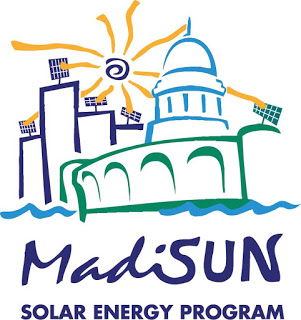
by jboullion | Sep 21, 2016 | Uncategorized
 September 13, 2016 – Madison.
September 13, 2016 – Madison.
Nearly 350 households in the Madison area have signed up to take the first step toward solar power for their homes, exceeding enrollment expectations for the MadiSUN Solar Group Buy Program. The City of Madison announced the Group Buy Program, along with a new Solar Energy Loan, in June of this year.
Twelve households have already signed contracts to install rooftop solar systems, putting the program well ahead of its goal to contract 15 solar systems by November 1, 2016. The solar systems contracted so far represent 55kw of solar electric capacity and over $150,000 in local renewable energy sales.
As MadiSUN approaches the end of its recruitment period on Monday September 19th, program managers remain optimistic that more households will choose to go solar.
“We are really pleased with the level of interest we’ve seen,” said Katherine Klausing, Engagement Manager at RENEW Wisconsin, the nonprofit program administrator. “Madison families recognize that putting solar panels on their homes can lower their energy costs and increase their property values. But it’s also an investment they can be proud to make. This is a step in the right direction.”
Interested households can sign up until Monday September 19 by visiting madisunsolar.com.
The success of the MadiSUN Group Buy comes at a time when cities across Wisconsin are looking at expanding access to solar. Solar group buy programs in Milwaukee, Racine and Eau Claire have also taken off this year. Nationwide, 73 percent of Americans say they want the US to prioritize renewable energy sources like solar and wind over fossil fuels like oil and gas.[1]
Many households are investing in solar to help their personal finances—a typical 4kw system can save a household over $1,700 in energy costs for each year of its 30-year life. But local solar energy businesses are also seeing a boost to their bottom lines.
“The MadiSUN Group Buy has been great in helping in us grow our business,” said Burke O’Neal of Full Spectrum Solar, a Madison-based solar installer selected to serve the group. As a result of the surge in new business, Full Spectrum Solar has hired an additional full-time staff member in its office and several part-time installers for its field crews.
Approximately 70 households have already taken advantage of a free solar property assessment, with dozens more scheduled this fall.
Madison resident Brian Lavendel is installing solar panels for himself and his neighbors, who rent the other part of Lavendel’s 2-unit home. “It was easy—it was like one-stop shopping. I attended an information session, which was particularly helpful because it brought together all of the pieces—the Group Buy, the federal tax credit, and the Focus on Energy program—so I got all of my questions answered. The fact that it was a Group Buy, with terms all set up, helped too. I didn’t have a lot of time to research the different companies and panels. I knew that RENEW Wisconsin had already negotiated on my behalf, so to speak,” Lavendel said. “This is something I’ve thought about for a long time. The low price of the panels and the increased efficiency in their energy production made it feasible. I probably could have done it earlier, but the MadiSUN program made it easy.”
Program Background: The MadiSUN Group Buy for Rooftop Solar program enables Madison residents to “go solar” together. The program selected Madison-based business Full Spectrum Solar to serve the group. The City’s investment in marketing and competitive bidding drove down the cost for each participant, resulting in savings of about 14 percent.
The cost of installing solar has never been lower, as homeowners can receive a Federal Tax Credit for 30 percent of the system cost, while Wisconsin’s Focus on Energy program offers up to $2400 in rebates for installing solar.
Madison Mayor Paul Soglin launched the programs in June as part of the City of Madison’s broader efforts to be more reliant on renewable energy sources. “These programs are going to be a financial win for all of us,” said Mayor Soglin in June as he launched the MadiSUN program. “They’re going to be a financial win for those who invest in solar and they’re going to be a financial win for our larger community.” In June the City passed an energy plan that seeks more renewable resources and proposes an inventory of city-owned land for solar energy development.

by jboullion | Sep 19, 2016 | Uncategorized
Milwaukee Journal Sentinel reporter Tom Content concludes that Wisconsin’s PSC has been far more generous to utility requests to raise monthly fixed charges on customers than regulators in other states. His article relies on research and testimony that RENEW Wisconsin submitted in Alliant Energy’s pending rate case, which contains a proposal to increase the fixed charge on residential customers from $7.56 today to $18 in 2018. In our direct testimony, RENEW urges the PSC to cap any increase approved at no more than $12/month, in line with the fixed charges assessed on residential customers in Sun Prairie and Stoughton, which are both served by municipal electric utilities surrounded by Alliant.
Read the full article online here, or below.
As Alliant Energy Corp. seeks to more than double its fixed customer charge on monthly electric bills over the next two years, a review of rate cases around the country finds that regulators in other states are taking a dimmer view of these proposals than Wisconsin.
Critics say the proposals to increase fixed fees, also known as monthly customer charges, penalize apartment dwellers and those who have taken steps to conserve energy. Utilities say they’re a fairer way to pay for the utility system.
Over the past two years, Wisconsin utilities have been aggressive in seeking big expansions of the customer charge, and the state Public Service Commission has been receptive, granting average increases of about 66%.
But around the country, as the issue has received more attention, 48 different utilities that have proposed to increase the fixed charge by at least 52% have had to settle for about one-fourth of that — just a 14% increase.
The increases represent a strategy that utilities turn to as a way to boost revenues at a time when electricity sales growth has flattened, with the prevalence of energy-saving devices and efforts by some customers to conserve to keep costs down.
Utilities say they’re trying to have the fixed portion of the bill start to represent parts of the utility system that don’t fluctuate with the price of energy. But consumer advocates say the changes penalize those who use little energy or have taken steps to conserve.
A key bone of contention between utilities and their critics is whether these fixed charge hikes pose a chilling effect on whether to conserve energy.
However, what is clear is that electricity customers who do not use a lot of energy face the biggest percentage price increases from moves to hike fixed charges.
An analysis of the impact of the rate changes proposed by Alliant’s Wisconsin Power and Light utility shows how the proposed charges would affect different kinds of customers. Under Alliant’s proposal, a customer who uses a typical amount of electricity every month would see fees increase of about 5% by 2018.
But a customer in a very large home, using twice as much power each month, would see bills drop by 1% by 2018. And someone who uses half as much power as the typical customer, whether living in a small apartment or having taken steps to cut back on power use, would see a much bigger increase of 17% in monthly bills.
Apartment dweller Hank Jacobi in Milwaukee says customers should be aware of the impact of fixed charges. He recalls when the We Energies charge was just 20 cents a day, and now it’s 52.
Jacobi spent more than two months in the hospital after a bicycle crash. When he returned home, he found that his monthly bill had gone up by about 26%.
“When I was away form home for 82 days, the fixed charge was still getting me,” he said. “It’s the charge you cannot avoid, no matter how many lights go off.”
Jacobi said it’s not that he can’t afford to pay more. But the 75% increase granted to We Energies in 2014 adds up to $82 a year for him.
“I know an awful lot of people in the city are in tough shape. For them to pay that much more a year, it’s going to hit hard,” Jacobi said. “They’ve been cut left and right, up and down.”
In a case now pending in Madison, Alliant Energy’s Wisconsin Power and Light Co. utility contends that recent PSC decisions involving other utilities show that its own fixed charge is well below the pack. After recent increases, Alliant’s fixed charge stands at just $7.67, well below We Energies ($16 a month), Madison Gas & Electric Co. ($19) and Wisconsin Public Service ($21).
Alliant’s proposal calls for more than doubling the charge, starting with a 56% increase in the customer charge in 2017, to $12 from $7.67. That would be followed by a 50% increase, to $18 a month, in 2018. The total increase: 135%.
“While the customer-charge change will increase bills for low users and decrease bills for high users, the change itself is neutral for the average customer,” Brian Penington, director of regulatory affairs at Alliant, said in a filing with the PSC. “On the whole, residential customers will experience a small increase … but WPL’s residential rates will continue to be among the lowest rates for Wisconsin’s large investor-owned utilities.”
Other states are taking a more skeptical view of fixed-charge increases, with some regulators rejecting any increase because it would discourage energy conservation.
Since 2014, 48 utilities in states other than Wisconsin have proposed to increase their fixed charges, by an average of 53%. A review of regulators’ decisions, compiled by the advocacy group Renew Wisconsin, found that commissions kept half of those fixed charges unchanged, and the average increase was 16%.
Inside Wisconsin, the PSC has approved much larger increases, with utilities seeking 96% on average and receiving 66%. But the commission in recent cases has given the utilities somewhat less, Renew Wisconsin says.
The utility says the cost of equipment to connect customers to the power grid has risen over the years, but its customer charge has remained in the range of $5 to $8 a month for more than two decades.
“Because we collect more of the power grid’s overall costs in the per-kilowatt-hour charge, and because we haven’t raised our fixed charge in many years, over time low-use customers have begun to pay less than what it costs to serve them,” said Annemarie Newman, a spokeswoman for Alliant.
A majority of the lowest energy users on the Alliant system are either vacation homes or cottages, according to the utility.
This is the first request by Alliant to change base electric rates since 2010, Newman said
Renew Wisconsin policy director Michael Vickerman said the increase “puts a larger portion of customer bills off-limits to potential savings from actions initiated by customers” to make their homes more energy efficient or to add solar power.
Renew urged the commission to cap Alliant’s fixed charge at $12 a month, which still would be a more than 56% increase from the current fee.
Jonathan Wallach, representing the customer group Citizens Utility Board, recommended the PSC limit Alliant’s customer charge to $9.
Nearly 100 Alliant customers have weighed in against the utility’s proposal in public comments filed with the commission. A public hearing is scheduled for Sept. 28 in Madison. A decision by the PSC is expected late this year.
Alliant has about 465,000 electricity customers across the state, mainly in southern and central Wisconsin.
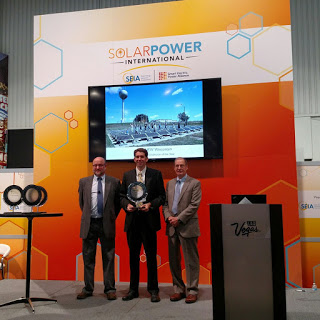
by jboullion | Sep 14, 2016 | Uncategorized
 |
RENEW Wisconsin’s Executive Director Tyler Huebner
receiving the Regulatory Champion of the Year award. |
RENEW Wisconsin has been honored as the 2016 “Regulatory Champion of the Year” by the Interstate Renewable Energy Council (IREC), a national organization working on the advancement of clean energy.
The award was given at the annual Solar Power International conference in Las Vegas on Tuesday night.
RENEW won this people’s choice award for leading the campaign to overturn a proposal by We Energies, Wisconsin’s largest electric utility, to charge extra fees to customers who generate power for their own use from sources such as solar panels. These so-called “connection fees” would have amounted to approximately $20 per month for a typical residential solar customer, and thousands of dollars per month for dairy farmers who generate electricity from cow manure.
After the Public Service Commission of Wisconsin (PSCW) approved We Energies’ unprecedented proposal in November 2014, RENEW Wisconsin partnered with The Alliance for Solar Choice, a national solar advocacy organization, to challenge the PSCW’s decision in Dane County Circuit Court.
In October 2015, Judge Peter Anderson ruled that there was not sufficient evidence in the regulatory proceeding to justify the agency’s decision allowing We Energies to impose additional fees on that subset of customers who produce power for their own use, giving RENEW Wisconsin and TASC the legal victory.
IREC’s 2016 3iAwards honor innovation, ingenuity, and inspiration from the nation’s best in both renewable energy and energy efficiency. This year, over 1,000 people voted for the finalists in the People’s Choice awards, which was “an impressively distinguished group of meritorious projects and acclaimed people” according to IREC’s website.
“Not only does renewable energy help citizens and businesses save money on their energy bills, it also drives economic expansion and creates family-supporting jobs. The solar industry alone now has over 200,000 employees nationally. Our legal victory protects the ability of citizens and businesses to use the sunshine striking their rooftops to reduce their electricity bills, and fuels growth in Wisconsin’s solar and renewable energy markets. We are honored to receive this recognition from an esteemed national organization and based on the popular support of our members and experts within our field,” said Tyler Huebner, RENEW Wisconsin’s Executive Director.
See all the IREC 3iAward winners here.
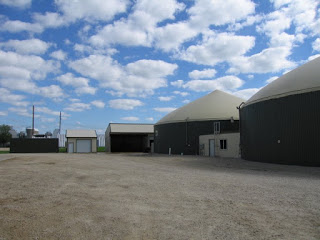
by jboullion | Sep 13, 2016 | Uncategorized
More information
Tyler Huebner, Executive Director
608-575-2201 (cell)
tyler.huebner@renewwisconsin.org
On Sunday, October 2nd, RENEW Wisconsin will host its 4th annual “Ride with RENEW” bicycle tour highlighting renewable energy projects, with this year’s tour taking place in Fond du Lac and Eden.
The bike tour will showcase five unique installations of renewable energy and energy efficient operations. In total, the ride is approximately 30 miles long, and the pace is leisurely. Each stop will include a brief tour and discussion with experts on the project.
 |
| Vir-Clar Farm’s Anerobic Digester |
The ride will start at UW-Fond du Lac’s parking lot, where the riders will learn about sustainability projects that UW-FdL and Fond du Lac High School have undertaken, including a geothermal heat pump and efficient lighting.
From there, riders will use the Fond du Lac Loop to go west and then south, making their way to the new Grande Cheese building. The building is very energy efficient, and the company has applied for a designation called “LEED,” which stands for Leadership in Energy and Environmental Design, to recognize its performance.
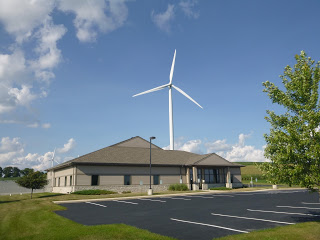 |
| Cedar Ridge Wind Farm |
Next, riders will go southeast of Fond du Lac to visit Vir-Clar Farm, where they are “producing milk and power for America.” Vir-Clar has a system called an anaerobic digester which accepts cow manure from the dairy on-site, and uses the methane to generate electricity. In addition, the remaining components from the manure are put to more effective and safe use.
The fourth stop will be Cedar Ridge Wind Farm in the Towns of Eden and Empire, where Alliant Energy representatives will provide an overview of the wind farm. This is a utility-scale wind farm with 41 turbines that collectively produce enough energy for approximately 17,000 homes annually.
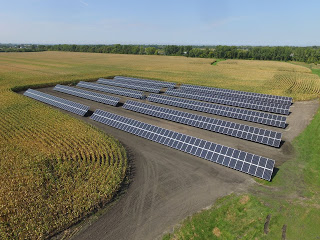 |
| Sisters of St. Agnes’ Solar Array |
Finally, riders will head back north to visit the Sisters of Saint Agnes, who installed a large solar energy production project in 2015. The solar project is about 50 times as big as a typical home solar installation.
Sponsors of the Ride include Eland Electric (Green Bay), Grande Cheese, Horicon Bank, Wegner CPAs, Madison Solar Consulting, J.F. Ahern, Miron Construction, Wisnet.com, and the Open Circle Unitarian Universalist Fellowship’s Earth Justice Now committee. There is still time to sponsor if your business or organization wishes to do so.
 Registration for the ride is open until the Monday preceding the ride, September 26th. The cost is $30 for members of RENEW Wisconsin, $40 for non-members, and $60 to both register for the ride and become a member of the organization for one year. Lunch will be catered by Eden Catering and will take place in Eden. The ride will start at 9am, and is expected to end by 4pm.
Registration for the ride is open until the Monday preceding the ride, September 26th. The cost is $30 for members of RENEW Wisconsin, $40 for non-members, and $60 to both register for the ride and become a member of the organization for one year. Lunch will be catered by Eden Catering and will take place in Eden. The ride will start at 9am, and is expected to end by 4pm.
“We are very much looking forward to touring some of Fond du Lac and Eden’s great renewable energy projects on Sunday, October 2nd,” said Tyler Huebner, Executive Director of RENEW Wisconsin. “Visiting Fond du Lac and Eden allows us to showcase a variety of ways to produce homegrown, clean energy right here in Wisconsin including wind, solar, and manure, and to learn more about innovative energy efficient building operations. This bike ride has historically been one of my favorite days of the year, and I anticipate 2016’s event will be phenomenal as well.”
Fond du Lac residents and members of RENEW Wisconsin Tom Schuppe and Jeanne & John McDowell have been instrumental in planning the route, logistics, and spreading the word.
The “Ride with RENEW” bike tour has been in a different part of Wisconsin each year; previous rides were held in Madison, Milwaukee, and Lake Geneva.
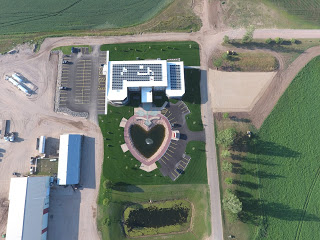
by jboullion | Aug 18, 2016 | Uncategorized
by Michael Vickerman, Program and Policy Director, RENEW Wisconsin
Signs of solar energy’s increasing appeal to growers and farmers continue to proliferate across rural Wisconsin. In the span of three weeks, RENEW took part in three separate events that document how growers are turning to the sun to power their operations as well as to nurture their crops.
 |
Heartland Farms’ new operation center in Adams County
is powered in part from a 95 kilowatt solar array. |
The first stop took us to Heartland Farms, one of the nation’s largest suppliers of chipping potatoes to many brands you see on grocery store shelves, located in Adams County a few miles west of Hancock. A fifth generation family operation with over 24,000 acres under cultivation, Heartland dedicated its newly opened Farm Operations, Technology and Training Center on August 4th. On its roof sits a 95-kilowatt array of photovoltaic panels that help power Heartland’s offices and the information technology needed to manage an operation that ships 11,000 semiloads of potatoes each year.
Incorporating sustainable features, including an onsite source of renewable electricity, into the functionality of the new building was a top priority of Alicia Pavelski, the family member who oversaw its design and construction. Says Pavelski: “Agriculture and sustainability have gone hand in hand for ages to ensure resources are available for generations to come. With advances in solar energy over the past few years, it was a logical next step for our farm. In the few short months we have had our array, it has been incredible to see the energy it has generated.”
Stevens Point-based North Wind Renewable Energy designed and installed Heartland’s solar electric system. North Wind has constructed similar-sized PV systems for Central Waters Brewery and Blenker Building Systems in Amherst, and Gaea’s Farm, a training facility for horses in Walworth County.
 |
This 24 kW array produces about half the electricity
used at Brockway Cranberry, Inc., near Black River Falls. |
The next week found us at the Wisconsin State Cranberry Growers Association (WSCSGA) Summer Meeting, Field Day and Trade Show on the grounds of Brockway Cranberry Inc., located a few miles southeast of Black River Falls. A supplier of cranberries to Ocean Spray, Brockway installed approximately 48 kilowatts of solar generation in 2012 and 2013, which powers the reservoir pumps as well as heats and lights the buildings on the premises. This spring Brockway put in four smaller arrays that aerate the reservoir water at the 86-acre marsh.
Thanks to Brockway’s arrays and the abundant sunshine provided by Mother Nature on August 10th, the association’s meeting and trade show was no doubt the first 100% solar-powered cranberry industry event anywhere. For further information on Brockway Cranberry and its owner, Jim Bible, visit the accompanying article by Deb Dorshorst that appears in the program guide for that event.
U.S. Solar Mounts, a solar contractor and ground mount system designer in nearby Sparta, constructed all of Brockway’s solar systems. Eric Pipkin, the owner of U.S. Solar Mounts, specializes in designing heavy-duty mounting structures supporting solar installations. His company also engineers and builds custom and containerized power systems (primarily solar) for off-grid and remote applications.
Many large food brands have adopted aggressive sustainability goals for their own operations, and they expect their suppliers to adhere to the same tough standards that they do. For Heartland’s Pavelski and Brockway’s Bible, their investment in solar energy flows from a business ethic built around the careful use of natural resources and avoiding waste wherever possible.
On August 16th, we journeyed to the Jerry Smith Country Store and Pumpkin Farm a few miles northwest of Kenosha. There, preparations were underway to slot in the final panel on a 9 kW array on the roof of a cheerfully decorated farm stand that has been operating at that location since 1971.
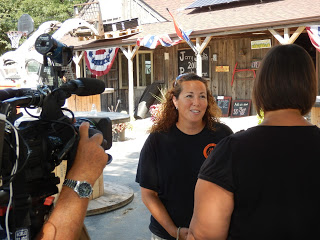 |
Beth Dankert of Smith Pumpkin Farm talking to a reporter
from WTMJ-TV (Channel 4 in Milwaukee). |
Smith Pumpkin Farm director of fun Beth Dankert shepherded the gathering past the farm’s numerous attractions, which now include several pedestal-mounted tracking arrays in addition to the 27 panels on the store’s roof.
“We went from considering a small solar tracker out by our pond to really becoming a business that can operate 110% of our electrical needs off solar,” Dankert told a WTMJ-TV reporter.
Walter Kreuser of Kenosha-based Kreuser Electric designed and installed the entire 18 kilowatt system, which will be energized before the end of August. A NABCEP-certified installer, Kreuser has also built solar electric systems for University of Wisconsin-Parkside and Gateway Technical College.
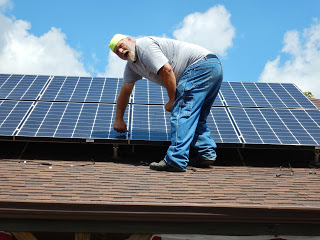 |
Kenosha-based solar installer Walter Kreuser adding the
final panel to the country store’s rooftop array. |
Support from Focus on Energy, Wisconsin’s energy efficiency and renewable energy program, took the form of a rebate totaling $2,400 and a zero-percent loan that covers 50% of the total installation cost. People’s Bank in Silver Lake provided the other half of the financing package for Smith Pumpkin Farm’s solar system.
As we at RENEW approach the end of our Summer of Solar – 2016, one thing stands out: each day more and more people are making the connection between clean energy and healthy food, and Wisconsin’s agricultural producers are stepping up to give their customers what they want.



